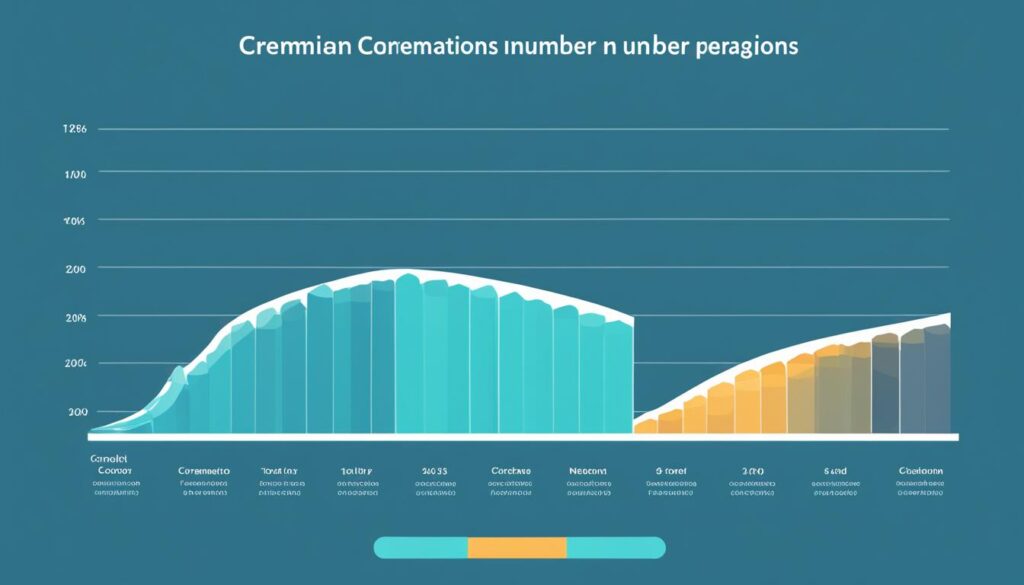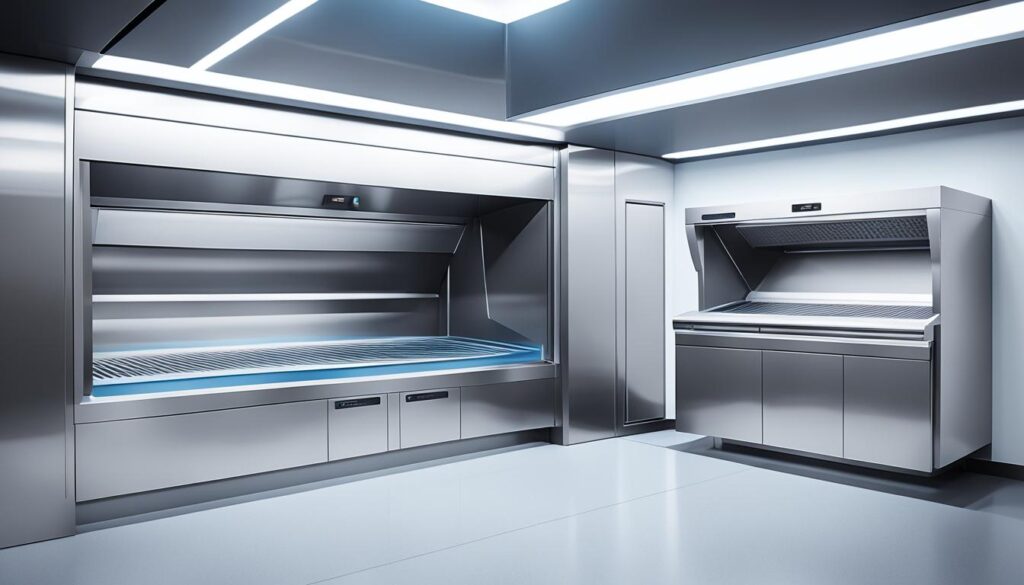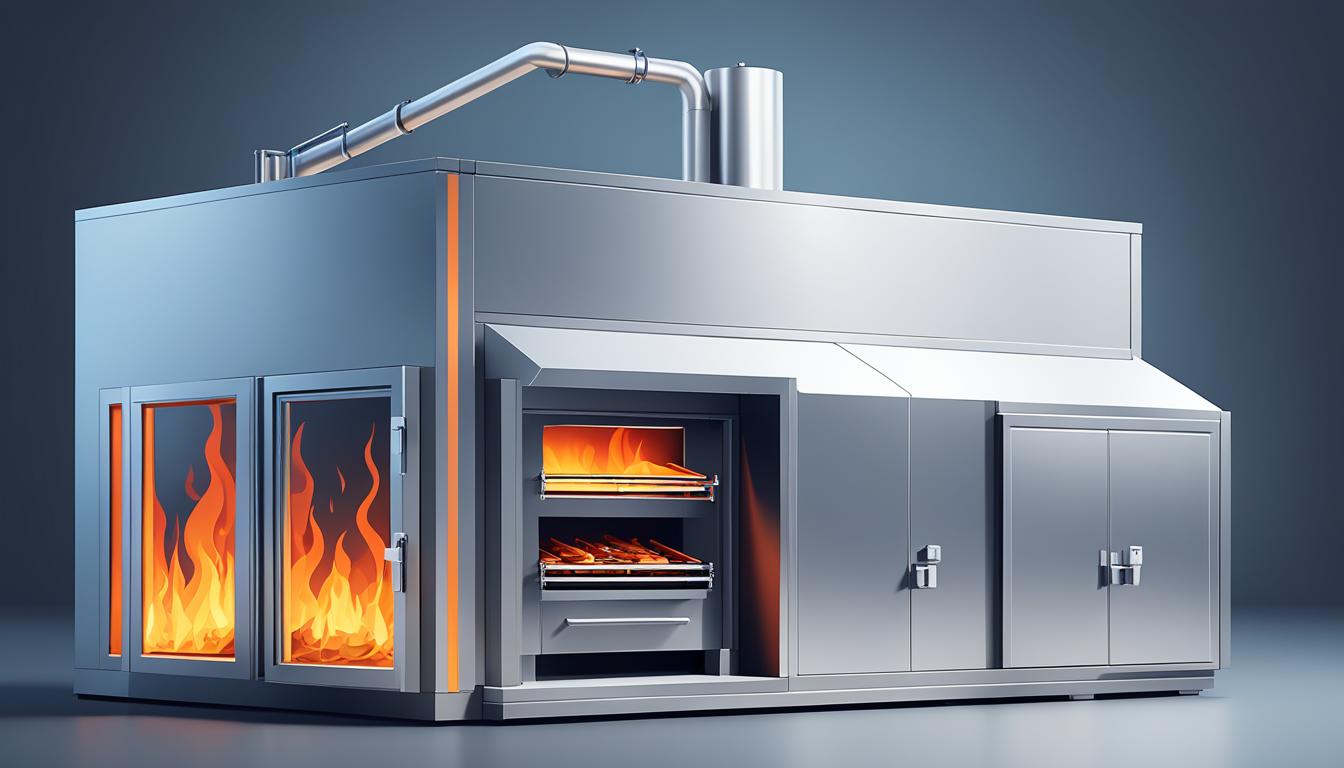Did you know that cremation rates in the United States have surged to over 50%, with projections indicating a continued upward trend? As more families opt for this end-of-life choice, the demand for cremation services is soaring, presenting a unique business opportunity for entrepreneurs. If you’re considering venturing into the cremation industry, now is an opportune time to learn how to start a crematorium business.
Embarking on this path requires meticulous planning, from navigating crematory regulations and securing crematorium permits to investing in state-of-the-art cremation equipment and optimizing crematory operations. You’ll need to dive deep into cremation industry trends, develop a robust crematorium marketing strategy, and carefully manage cremation costs while scouting the perfect crematorium location.
Throughout this guide, we’ll walk you through the essential steps to turn your vision into a thriving reality. From conducting thorough market research and crafting a comprehensive business plan to building a compassionate team and promoting your services, we’ve got you covered. Let’s dive in and explore how you can establish a successful crematorium that provides dignified and meaningful services to families during their most difficult moments.
Key Takeaways
- Cremation rates in the US have surpassed 50% and are expected to continue rising
- Starting a crematorium requires careful planning, regulatory compliance, and significant investment
- Essential steps include market research, business planning, securing finances, choosing a location, and investing in equipment
- Building a compassionate team and developing a strong marketing strategy are crucial for success
- Providing dignified and meaningful services to families is at the heart of running a successful crematorium business
Understanding the Cremation Industry
The cremation industry has experienced significant growth and transformation in recent years, driven by changing societal attitudes, shifting cultural norms, and evolving consumer preferences. As an aspiring crematorium owner, it is crucial to grasp the current state of the industry and anticipate future trends to position your business for success. By staying informed about cremation industry statistics, rates, market growth, and demand, you can make strategic decisions that align with the needs and expectations of your target audience.
Current Trends and Statistics
The cremation industry has witnessed a steady rise in cremation rates across the United States. According to the Cremation Association of North America (CANA), the national cremation rate reached 54.6% in 2019, surpassing the rate of traditional burials for the first time in history. This trend is expected to continue, with projections suggesting that the cremation rate will climb to 72.8% by 2030. Several factors contribute to this shift, including increased affordability, environmental consciousness, and a growing desire for personalized and flexible memorial options.
Growth Potential and Market Demand
As cremation becomes the preferred choice for more Americans, the cremation industry is poised for substantial growth and increased market demand. The aging Baby Boomer generation, coupled with changing religious landscapes and increased geographic mobility, has further fueled the demand for cremation services. This presents a unique opportunity for entrepreneurs to enter the market and establish a thriving crematorium business that caters to the evolving needs of families seeking dignified and compassionate care for their loved ones.
To capitalize on this growth potential, it is essential to prioritize three key aspects of your crematorium business:
- Acquiring the appropriate licenses and adhering to regulations forms the bedrock of your future establishment, ensuring its legitimacy and trustworthiness.
- Investing in high-quality equipment cannot be overlooked, as it underscores your commitment to providing respectful and dignified services.
- Curating a compassionate team who shares your vision will elevate the experience you offer to grieving families, making it more heartfelt and genuine.
By focusing on these critical elements, you can position your crematorium as a trusted and respected provider in the growing cremation market, meeting the increasing demand for professional and empathetic cremation services.
Conducting Thorough Market Research
As an aspiring entrepreneur in the cremation industry, investing time in thorough market analysis is non-negotiable. Immersing yourself in cremation market research allows you to grasp the needs of your potential clients deeply, paving the way for tailored services that resonate with your target demographic.

Identifying Your Target Demographic
Understanding your target demographic’s needs and preferences is crucial for shaping your cremation services accordingly. By delving into their unique requirements, you can craft offerings that genuinely connect with their emotions during trying times. This level of empathy and customization can set your business apart in the competitive cremation market.
Analyzing Local Competition
Conducting a comprehensive competitive analysis is another pillar of effective market research. Scrutinizing your local competition provides valuable insights into their pricing strategies and reveals potential gaps in the market that your crematorium can fill. By identifying these opportunities, you can carve out a unique niche and establish a strong foothold in the cremation industry.
Determining Pricing Strategies
Crafting a well-informed pricing strategy is essential for the success of your cremation business. Thorough market research helps you strike the right balance between profitability and competitiveness. Consider factors such as operational costs, target demographic’s spending capacity, and competitors’ pricing when determining your cremation pricing strategies. Remember, personalization of services can justify premium pricing, as customized urns and memorial ceremonies strengthen your reputation through word-of-mouth endorsements.
Embracing technology can streamline your operations and marketing efforts in the cremation services industry. Platforms like Desygner offer user-friendly design solutions for creating promotional materials and custom memorials, enhancing your online presence and connecting with your target audience effectively.
Navigating Legal Requirements and Regulations
Launching a successful crematorium business involves navigating through a complex maze of legal requirements and regulations. These laws and regulations can vary significantly from one jurisdiction to another, making it crucial for entrepreneurs to dedicate substantial time to understanding the specific rules that apply in their area. Failing to comply with these regulations can lead to significant legal troubles, potentially derailing your business before it even begins.
Obtaining Necessary Licenses and Permits
To operate a crematorium legally, you must obtain the necessary crematory licenses and cremation permits. These requirements often include:
- State funeral director or crematory operator license
- Local business license
- Zoning permits
- Building permits for construction or renovation
- Environmental permits for air quality and emissions
Researching and securing these licenses and permits can be a time-consuming process, but it is essential to ensure your crematorium business operates within the bounds of the law.
Complying with State and Local Laws
In addition to obtaining licenses and permits, crematorium owners must comply with various state cremation laws and local cremation regulations. These laws and regulations may cover aspects such as:
- Cremation authorization and documentation requirements
- Handling and storage of human remains
- Cremation process standards and procedures
- Disposition of cremated remains
- Record-keeping and reporting requirements
Staying up-to-date with changes in state and local laws is crucial to maintaining compliance and avoiding legal issues.
Understanding Environmental Regulations
Crematoriums are subject to environmental regulations for crematories, particularly those related to air quality and emissions. In most states, new crematories must be approved by the Air Quality Division of the Department of Environment or a similar agency. An application to construct, install, and operate must be filed with the environmental division, and a permit must be granted before a cremation unit can be installed and placed in operation.
Working with experienced cremation equipment providers, such as U.S. Cremation Equipment, can help streamline the environmental permitting process. These providers can prepare the necessary applications and documents for submission, ensuring that their equipment complies with air quality and environmental requirements and regulations in all 50 states.
By dedicating time and effort to understanding and complying with the various legal requirements and regulations surrounding crematoriums, you can establish a solid foundation for your business and avoid costly legal issues down the road.
Securing Financing for Your Crematorium
Starting a crematorium business requires a significant financial investment. Setting up the facility, purchasing cremation equipment, and covering operational costs such as utilities, maintenance, and staff salaries can quickly add up. To navigate these financial pressures successfully, it’s essential to craft a detailed financial plan and secure the necessary funding.
When it comes to crematorium financing, you have several options to consider. One avenue is to work with your local bank to secure a business loan. Banks are often willing to lend to well-prepared entrepreneurs with a solid business plan and financial projections. However, it’s important to note that the cremation industry may be unfamiliar territory for some banks, so be prepared to educate them about the market potential and your plans for success.
Another option for financing your crematorium startup costs is to partner with an outside finance company through your cremation equipment provider. Many equipment manufacturers have established relationships with financial institutions that specialize in the death care industry. These lenders understand the unique challenges and opportunities of the cremation business and may be more willing to provide the necessary funds.
When seeking cremation equipment financing, it’s crucial to work with reputable manufacturers who offer high-quality, reliable equipment. Investing in durable, efficient cremation chambers and other essential equipment will help ensure the long-term success of your business. Look for manufacturers who provide comprehensive support, including installation, training, and ongoing maintenance, to minimize downtime and keep your operations running smoothly.
As you develop your financial plan, be sure to consider all of the costs associated with starting and operating a crematorium. These may include:
- Real estate purchase or lease
- Cremation equipment acquisition
- Building renovations or construction
- Permits and licenses
- Insurance
- Utilities (gas, electricity, water)
- Staff salaries and benefits
- Marketing and advertising expenses
By carefully evaluating your startup costs and projected revenue, you can develop a realistic financial plan that will help you secure the necessary financing and set your crematorium business up for long-term success. Don’t hesitate to seek guidance from financial advisors, industry experts, and successful crematorium owners as you navigate this process.
Choosing the Right Location
Selecting the optimal crematorium location is a critical decision that can significantly impact the success of your business. When evaluating potential sites, it’s essential to consider factors such as zoning requirements, accessibility, proximity to funeral homes, and the suitability of the facility itself.
Before settling on a location, it’s crucial to determine if the property is properly zoned for a crematory. Although most communities allow crematories in business, commercial, and industrial zones, it’s always wise to contact the Zoning and/or Planning Department in the township, city, or county where the property is located for a definitive ruling. Keep in mind that local regulations governing crematories may vary, and in some communities, this type of activity may not have been specifically addressed.
Zoning Requirements and Restrictions
Navigating the complex world of crematory zoning can be challenging, but it’s a necessary step in establishing your business. U.S. Cremation Equipment offers valuable assistance in obtaining zoning approval, ensuring that your chosen location meets all the necessary requirements. By working closely with experienced professionals, you can streamline the process and avoid potential pitfalls.
Accessibility and Proximity to Funeral Homes
When choosing a crematorium location, it’s important to consider its accessibility and proximity to funeral homes. A conveniently located facility can foster strong relationships with local funeral directors, leading to increased referrals and a steady stream of business. Additionally, an easily accessible location can provide a more seamless experience for grieving families during a difficult time.
Building or Renovating a Facility
Whether you’re building a new crematorium facility or renovating an existing one, there are several key factors to consider. When evaluating existing locations, determine if any building modifications are needed to accommodate additional cremation unit installations. It’s also essential to assess the gas and electrical requirements within the building to ensure that your chosen location can support the necessary equipment.
The initial investment to start a crematorium typically ranges between $100,000 and $250,000, depending on the location and services offered. Ongoing monthly expenses for a crematorium average around $10,000 to $15,000, varying with the number of cremations performed. By carefully considering these costs and the potential for increased profit through additional services like wearable remains, plantable remains, space launch services, and carbon-free cremation processes, you can make an informed decision about your crematorium facility.
Investing in Essential Cremation Equipment
When starting a crematorium business, investing in high-quality cremation equipment is crucial to providing respectful and dignified services. While choosing the right equipment may seem intimidating at first, cremation equipment providers will guide you through the entire process.

- Cremation chambers (retorts) for humans or pets
- Refrigeration units for body storage
- Cremated remains processing equipment
- Loading table
You’ll also need accessories such as safety wear (aprons, gloves, goggles), urns and ID discs, and clean out tools and strip brushes.
Cremation Chambers and Retorts
The heart of your crematorium will be the cremation chambers or retorts. U.S. Cremation Equipment’s “Classic” line of cremators features a proven and field-tested automatic PLC operating system with color touch screen control. This system monitors and controls chamber temperatures, combustion air supply, and timing cycles for purging, preheating the pollution control chamber, cremation, and cool-down cycles.
The automatic system limits operator involvement while enabling visual checks of each stage and status of the process, including chamber temperatures, combustion air, elapsed time, and burner operation. Complete combustion is achieved in the temperature-controlled large secondary chamber, converting over 99% of volatilized carbon into carbon dioxide.
Refrigeration Units and Body Storage
Proper refrigeration and storage of bodies prior to cremation is essential. Investing in reliable refrigeration units ensures the dignified handling of the deceased. Consider the capacity you’ll need based on your projected volume of cremations.
Cremated Remains Processing Equipment
After the cremation process, the cremated remains must be processed. This involves removing any metal debris and pulverizing the remains into a fine powder. Specialized cremated remains processing equipment streamlines this process and ensures consistency.
When selecting your cremation equipment, look for a reputable supplier who offers comprehensive training and support. U.S. Cremation Equipment, for example, has certified trainers who will train your crematory personnel in the operation of the cremator and issue Certificates of Training. They also provide a two-year warranty on their equipment and around-the-clock technical assistance.
Remember, the quality of your cremation equipment reflects your commitment to providing exceptional service to the families you serve. Investing in the right equipment sets the foundation for a successful and reputable crematorium business.
Building a Compassionate and Professional Team
Curating a compassionate crematorium staff who shares your vision will elevate the experience you offer to grieving families, making it more heartfelt and genuine. Dealing with bereaved families requires a level of empathy and sensitivity unique to few other professions.
It’s crucial for you and your cremation technicians to develop strong emotional resilience to support clients effectively while safeguarding your own mental health. Grief training sessions can be invaluable for enhancing communication skills during these sensitive interactions. Balancing professionalism with compassion is key to maintaining both client satisfaction and employee well-being.
Consider the following when building your team:
- Seek out individuals with a genuine desire to help others during difficult times
- Provide ongoing grief training and support for your crematorium staff to prevent emotional burnout
- Encourage open communication and create a supportive work environment
- Lead by example, demonstrating the perfect balance of professionalism and empathy
U.S. Cremation Equipment has certified trainers that will train cremation technicians in the operation of the cremator and issue Certificates of Training. This ensures that your crematorium staff is well-equipped to handle the technical aspects of their job while maintaining a focus on providing compassionate service.
Developing a Comprehensive Business Plan
A well-crafted business plan is the foundation upon which your crematorium venture will thrive. As you embark on this journey, it’s crucial to define your mission and vision clearly. What sets your cremation services apart from others in the industry? What core values guide your business decisions? Answering these questions will help you establish a strong identity and purpose for your crematorium.
Next, dive into the financial aspects of your business plan. Outline your financial projections and goals, taking into account startup costs, operating expenses, and revenue targets. Be realistic in your estimates and consider various scenarios to ensure your crematorium remains financially viable in the long run. Seeking the advice of a financial professional can provide valuable insights and help you make informed decisions.
Finally, no crematorium business plan is complete without a robust marketing strategy. Understanding your target audience is key to reaching them effectively. Develop a multi-faceted approach that includes both traditional and digital marketing tactics. A user-friendly website that provides comprehensive information about your cremation services is essential in today’s digital landscape. Leverage social media platforms to connect with your community on a more personal level, building trust and establishing your brand as a compassionate and professional resource. Don’t forget the power of search engine optimization (SEO) strategies to ensure that those seeking cremation services can easily find you online.
By crafting a comprehensive crematorium business plan that encompasses your mission, financial projections, and marketing strategy, you lay the groundwork for a successful and impactful venture. Your dedication to providing exceptional service and support to grieving families will shine through in every aspect of your business, positioning you as a trusted leader in the cremation industry.
FAQ
What are the current trends and statistics in the cremation industry?
How do I conduct thorough market research for my crematorium business?
What legal requirements and regulations do I need to be aware of when starting a crematorium?
How can I secure financing for my crematorium startup?
What should I consider when choosing a location for my crematorium?
What essential cremation equipment do I need to invest in?
How do I build a compassionate and professional team for my crematorium?
What should I include in my crematorium business plan?
Author
-

Lucas Martinez is an accomplished entrepreneur with a passion for startups. He has launched and scaled multiple businesses, providing pragmatic advice on starting and growing a business.
View all posts



